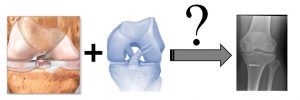While playing, an athlete hears a “pop” in their knee and falls to the ground. There is immediate pain and swelling and they are unable to weight bear on the leg. Due to the protective muscle tone, stability tests are just not possible.
The patient is informed that it could be an ACL tear and that an MRI is needed to confirm this. Since the MRI can take months to get (at least in Canada, unless you’re a professional athlete), the patient has to just wait and wait while limping using crutches and wearing a brace for a number of weeks.
Then finally when the MRI confirms the tear, they are booked for surgery. Sadly in the months to come, this athlete continues to wait and wait and never be given the option that perhaps surgery may not even be warranted.
The fact is that there is up to an 8-fold increase in the odds for developing knee OA after an ACL injury, where 50% of the young population post ACL injury develop knee OA by middle age.
“ACL injury markedly increases the risk for development of knee OA” – Webster K 2022
The question is, “Does ACL reconstruction actually reduce that risk?”
A common myth that I’ve heard in the past 3 decades is that “If you don’t get your ACL surgically repaired, your chances of developing OA in the future is increased.”

But where is the evidence?
This 2022 systematic review based on 13 review studies concludes that, “Surgical treatment does not reduce OA prevalence in the longer term compared with nonsurgical treatment.” – Webster K 2022
It must be said that to date, there are no randomized trials post ACL injuries to support a specific intervention that can eliminate the risk of developing OA in the future.
What is however known is that the risk for knee OA is higher in those…
i) With a higher BMI
ii) With quadriceps muscle weakness
iii) Who are physically inactive

This study shows that adolescents who sustain an ACL injury are predictably more likely to become physically inactive and gain fat mass after 10 years.
Therefore aggressive ongoing quad strengthening and encouraging alternative physical activities that perhaps don’t involve pivoting may be the key to preventing long-term OA, irrespective of whether they get reconstruction or not.


